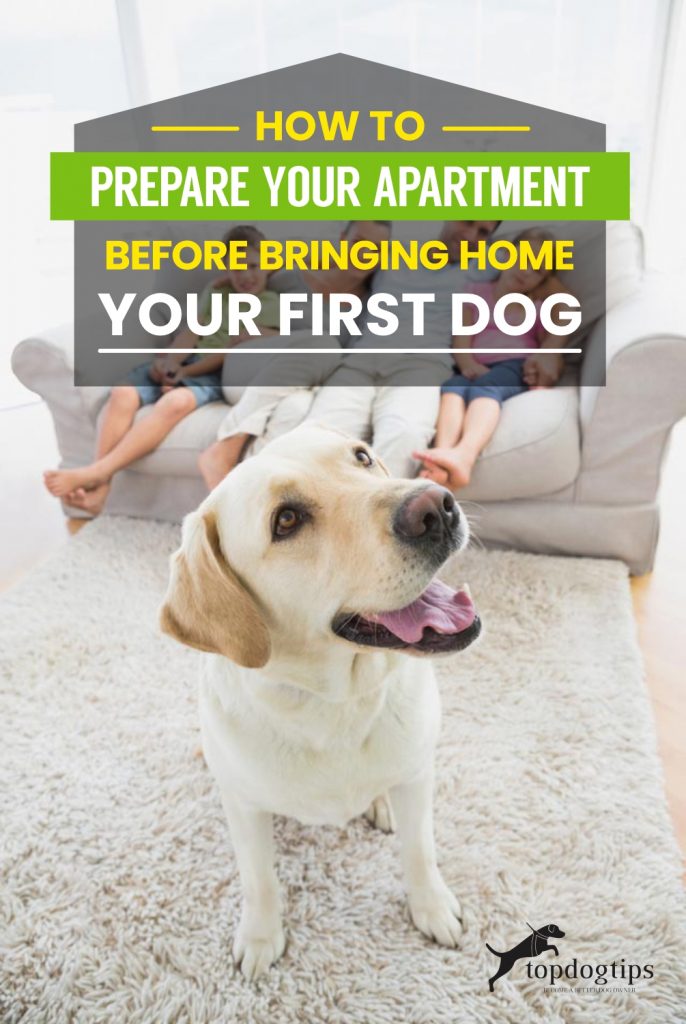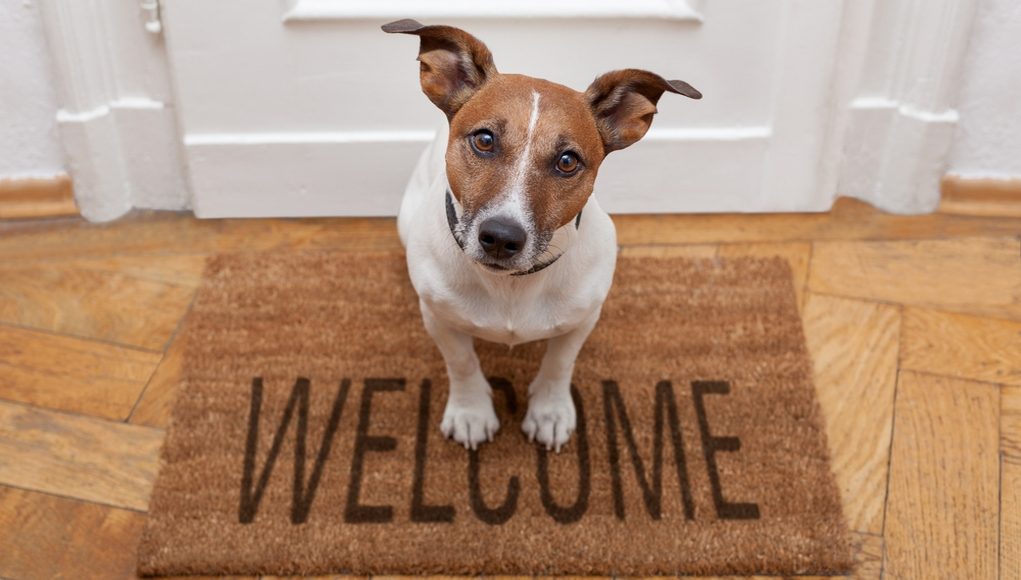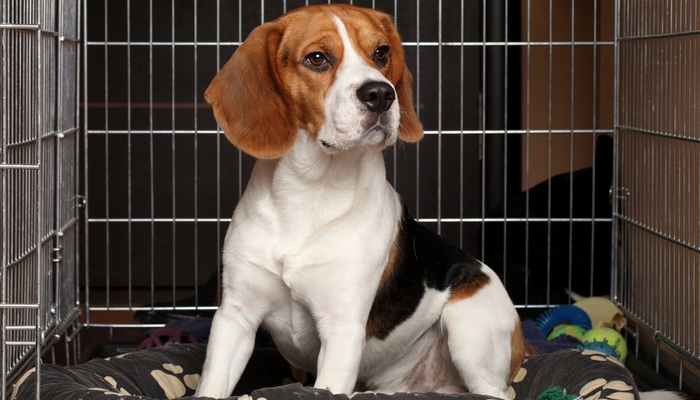Table of Contents
Dogs are wonderful pets and bring many families a lot of joy.
If you live in an apartment and want to add a furry friend to your home, don't worry!
It's totally possible to find a dog that's suited to apartment living.
No matter what type of dog you choose, though, you'll need to sufficiently prepare your apartment so it's safe and secure for your pup.
When you make the choice to adopt a dog, you're signing up for a long-term responsibility. That responsibility starts before you even bring your Fido home.
Doggy-proofing your apartment is step number one.
You need to make sure your environment is safe for your new canine companion.
Think of it like baby proofing your home.
You want to make the house safe for the child to explore.
Your new dog is going to want to explore his environment too, and it's up to you to make sure that he can do it safely.
Let's go through some dog apartment tips!
How to Have A Dog In An Apartment
Decide on a Dog First and Foremost
The first thing, of course, is deciding what kind of dog you'll get.
In order to narrow it down, first look at the breeds allowed in your apartment building.
Most complexes have restrictions based on dog breeds and weight when full-grown.
A lot of times, you'll see “aggressive” breeds banned – including pit bulls, chow chows, German shepherds, and rottweilers.
Most apartments also restrict weight to 50 pounds or under.
Make sure you check with your landlord BEFORE you adopt a dog to ensure your new addition will be welcome at your building.
The other thing to consider is how suited a dog will be to apartment life.
Your dog will be living in a smaller space, pretty much always indoors, and won't have access to a free running yard.
High-energy dogs like poodles, huskies, greyhounds, and collies will feel cooped up in an apartment and can wreak havoc on your home and lifestyle.
Instead of these breeds, consider a small, versatile breed like the chihuahua, dachshund or bichon frise.
RELATED: 25 Best Dog Breeds for Small Apartments
Safety First for You and Your Pup
Safety is the most important consideration when it comes to getting a dog, especially a puppy.
Think of it like having a toddler running around your home – they are smart enough to get into everything, but don't understand what's dangerous and what's safe.
Use child-proof locks on cabinets containing poisonous chemicals and cleaners to help your dog stay safe.
Do a sweep of your apartment and move what you can, lock up what you can't.
Another important thing to consider that many people forget is the toilet.
Always keep the toilet lid closed if you use an automatic toilet cleaner that releases cleaner when flushing.
Dogs love to drink out of the toilet, and even small dogs will find a way to get in there!
It's best to learn to keep the lid closed at all times.
The last thing to remember is cosmetics.
Cosmetics tend to have very appealing ingredients to dogs, meaning they'll try to eat them!
This is especially true for scented or flavored products like lip gloss or lotion.
Keep all your cosmetics up on a high counter or away in plastic containers or drawers to protect your dog (and your wallet).
RELATED: 15 Reasons to Consider Pet Safety Gates for Your Dog
Crate Training a Dog is Important
A dog left alone in a small apartment can get into trouble quickly.
This means he might cause damage to your apartment by chewing, going to the bathroom, or digging.
It can be costly to repair these damages when it's time to move out!
Consider crate training to keep your dog out of trouble and safe while you're away.
Crate training is a humane way to keep your dog calm when needed.
Get a crate that allows your dog to stand up and turn around.
Don't get one too big or too small; that will defeat the purpose!
You can also crate him at night if you choose. This will keep him from getting into mischief when you can't watch him.
Once you've purchased the crate, start introducing your dog to it.
Don't just lock him in and leave the house for hours. Let your dog explore it on his own.
Put a soft bed inside so it's comfortable and welcoming for him.
Many dogs will take to their crate immediately; it's a safe haven for them.
If your dog is on the fence about it, reward him when he uses the crate with treats and praise.
Once he begins getting a bit comfortable with the crate, start closing the door for short periods.
Begin slowly and work your way up.
If he is doing well in the crate, showing no signs of anxiety or fear, you can leave him in the crate for short periods while you are gone.
House Training Your Dog
This is where dog owners tend to have the most frustration, especially when it comes to apartment living.
Without a doggy door leading out to a yard, getting your dog on a regular potty schedule is important.
Otherwise, you'll end up with annoying accidents that can cause damage to your apartment, especially if there's carpeting.
When you bring your dog home, it's best to start a schedule right away.
Remember that your dog will likely have to go after he eats, so that's a good time to take him out.
Most adult dogs need to go out four times a day, so prepare for this and consider toilet training your pup.
You may need to hire someone to let your dog out if you are away for a good chunk of the day.
When your dog goes outside, always praise and reward him with a treat, especially during the house training phase.
Take him to the same potty spot each time to make the process quicker.
When an accident happens (and it will), don't overly scold your dog, especially if you didn't see him do it.
Clean it up without fuss and continue to praise him for doing his business in the right place – outside.
Use enzyme cleaners for the best results; these cleaners remove odors and help ensure your dog won't go in the same place again.
Just because you live in an apartment doesn't mean you can't have the companionship of a dog.
With a little effort, you can make your rental home a dog-friendly haven.
Remember to keep up with care and safety; you and your dog will get along just fine in an apartment.
READ NEXT: The Benefits of Hiring a Pet Sitter


















